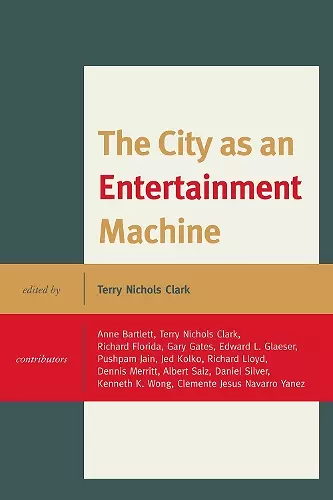The City as an Entertainment Machine
Format:Paperback
Publisher:Bloomsbury Publishing PLC
Published:24th Feb '11
Currently unavailable, and unfortunately no date known when it will be back

This volume explores how consumption and entertainment change cities, but it reverses the 'normal' causal process. That is, many chapters analyze how consumption and entertainment drive urban development, not vice versa. People both live and work in cities and where they choose to live shifts where and how they work. Amenities enter as enticements to bring new residents or tourists to a city and so amenities have thus become new public concerns for many cities in the U.S. and much of Northern Europe. Old ways of thinking, old paradigms — such as 'location, location, location' and 'land, labor, capital, and management generate economic development' — are too simple. So is 'human capital drives development'. To these earlier questions we add, 'How do amenities and related consumption attract talented people, who in turn drive the classic processes which make cities grow?' This new question is critical for policy makers, urban public officials, business, and non-profit leaders who are using culture, entertainment, and urban amenities to enhance their locations — for present and future residents, tourists, conventioneers, and shoppers. The City as an Entertainment Machine details the impacts of opera, used bookstores, brew pubs, bicycle events, Starbucks' coffee shops, gay residents, and other factors on changes in jobs, population, inventions, and more. It is the first study to assemble and analyze such amenities for national samples of cities (and counties). It interprets these processes by showing how they add new insights from economics, sociology, political science, public policy, and geography. Considerable evidence is presented about how consumption, amenities, and culture drive urban policy by encouraging people to move to or from different cities and regions.
The City as an Entertainment Machine brings together a number of research projects conducted largely in America and one in the UK, which seek to assess the impacts of ‘amenities’ on urban growth. The thesis is that the consumer is the all-powerful figure who can generate a level of economic growth for a place and it is therefore important to understand this consumer in more detail, in order that places know how to meet consumer demand. The volume as a whole considers policy to be a straightforward and one-way set of discourses in which, providing the amenities are present, the consumer will continue obediently to demand commodities. How these policies are understood, ignored and resisted by different groups in the public sphere is not up for consideration, which limits the insights offered. * Urban Studies *
ISBN: 9780739124222
Dimensions: 231mm x 156mm x 17mm
Weight: 442g
292 pages